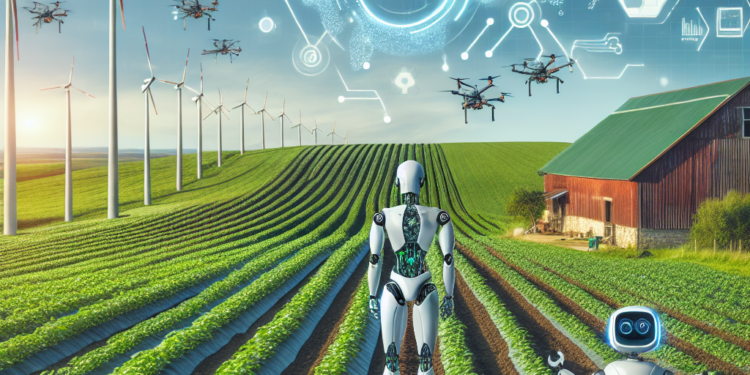Artificial Intelligence (AI) has been making waves in virtually every industry, and agriculture is no exception. In recent years, AI technology has been revolutionizing the way farmers grow crops, raise livestock, and manage their land. One of the most significant impacts AI has had on the agricultural industry is in advancing sustainable practices.
Sustainable agriculture is a crucial aspect of our efforts to combat climate change and protect our environment. Traditional farming methods can be harmful to the environment, with practices such as overuse of pesticides, excessive water consumption, and soil degradation. AI has the potential to address many of these challenges and help farmers transition to more sustainable practices.
One of the key ways AI is improving sustainable agriculture is through precision farming. Precision farming involves using data and technology to optimize agricultural practices, such as planting, irrigation, and fertilization, to maximize yields while minimizing inputs. AI algorithms can analyze vast amounts of data from sensors, drones, satellites, and other sources to provide real-time insights into the health of crops, soil conditions, and weather patterns. This data allows farmers to make more informed decisions about when and where to apply water, nutrients, and pesticides, reducing waste and increasing efficiency.
For example, AI can help farmers monitor soil moisture levels and predict when crops need irrigation, reducing water consumption and runoff. AI-powered drones equipped with multispectral cameras can detect crop diseases and pests early, allowing farmers to take targeted action to prevent outbreaks and reduce the need for chemical pesticides. By optimizing planting densities and patterns based on soil and weather conditions, AI can increase crop yields and reduce the amount of land needed for agriculture, preserving natural habitats and biodiversity.
Another way AI is enhancing sustainable agriculture is through crop breeding and genetic engineering. AI algorithms can analyze genetic data to identify traits that improve crop resilience, yield, and nutritional value. By accelerating the breeding process, AI can help scientists develop new crop varieties that are better adapted to changing climate conditions, such as drought or heat stress. These “climate-smart” crops require less water and fertilizer, are more resistant to pests and diseases, and can help farmers cope with the challenges of a warming planet.
AI can also help farmers manage their livestock more sustainably. By monitoring animal behavior and health data, AI can detect signs of illness or stress early, allowing farmers to provide timely interventions and improve animal welfare. AI-powered sensors can track feed consumption, weight gain, and milk production, helping farmers optimize feeding regimens and reduce waste. By using AI algorithms to predict market demands and adjust production accordingly, farmers can prevent overproduction and reduce food waste.
In addition to improving on-farm practices, AI is also contributing to sustainable agriculture through supply chain management and logistics. AI algorithms can optimize transportation routes, storage facilities, and distribution networks to minimize food spoilage and reduce carbon emissions. By tracking the environmental footprint of agricultural products from farm to fork, AI can help consumers make more informed choices and support businesses that prioritize sustainability.
Despite its many benefits, AI in agriculture also raises concerns about privacy, data security, and job displacement. Farmers must ensure that the data collected by AI systems is protected from misuse and unauthorized access. They also need to be trained in using AI technology effectively and ethically to avoid unintended consequences on the environment and society.
In conclusion, AI has the potential to revolutionize sustainable agriculture practices by enabling precision farming, crop breeding, livestock management, and supply chain optimization. By harnessing the power of AI to make data-driven decisions, farmers can grow more food with fewer resources, reduce environmental impact, and build resilient food systems for the future. As we face the challenges of climate change, population growth, and food security, AI will play a critical role in shaping the sustainable agriculture practices of tomorrow.













